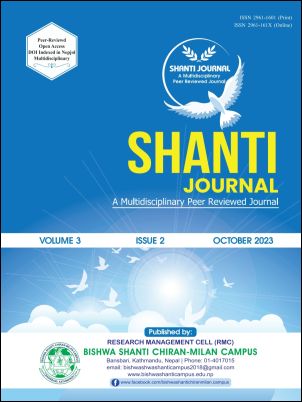Psychological Trauma in Anand’s Across the Black Waters
DOI:
https://doi.org/10.3126/shantij.v3i1-2.60855Keywords:
Dislocation, Psychological trauma, Sepoy, Alienation, Dislocation DisintegrationAbstract
This paper explores the issue of psychological trauma in Mulk Raj Anand’s novel “Across the Black Waters,” shedding light on the profound impact of World War I on Indian soldiers under British rule. Central to the narrative is Lalu, a sepoy whose journey unveils the stark realities of trench warfare, the constant specter of death, and the brutalities of battle. The soldiers navigate the complex terrain of dislocation and alienation, torn between allegiance to their homeland and serving the British Empire, all while contending with prejudice within the military hierarchy. The aftermath of the war reverberates in the soldiers’ lives, marked by the enduring symptoms of post-traumatic stress disorder (PTSD)—nightmares, flashbacks, anxiety, and depression. Through the lens of Lalu’s perspective, this paper exposes the emotional toll exacted on these individuals amidst the multifaceted challenges of war and colonialism. Importantly, the paper employs a novel approach, applying trauma theory as a conceptual framework to delve into the psychological dimensions of the narrative, thereby offering a nuanced understanding of the characters’ experiences in “Across the Black Waters.”
Downloads
Downloads
Published
How to Cite
Issue
Section
License
Copyright (c) 2023 The Author(s)

This work is licensed under a Creative Commons Attribution-NonCommercial 4.0 International License.
This license enables reusers to distribute, remix, adapt, and build upon the material in any medium or format for noncommercial purposes only, and only so long as attribution is given to the creator.




